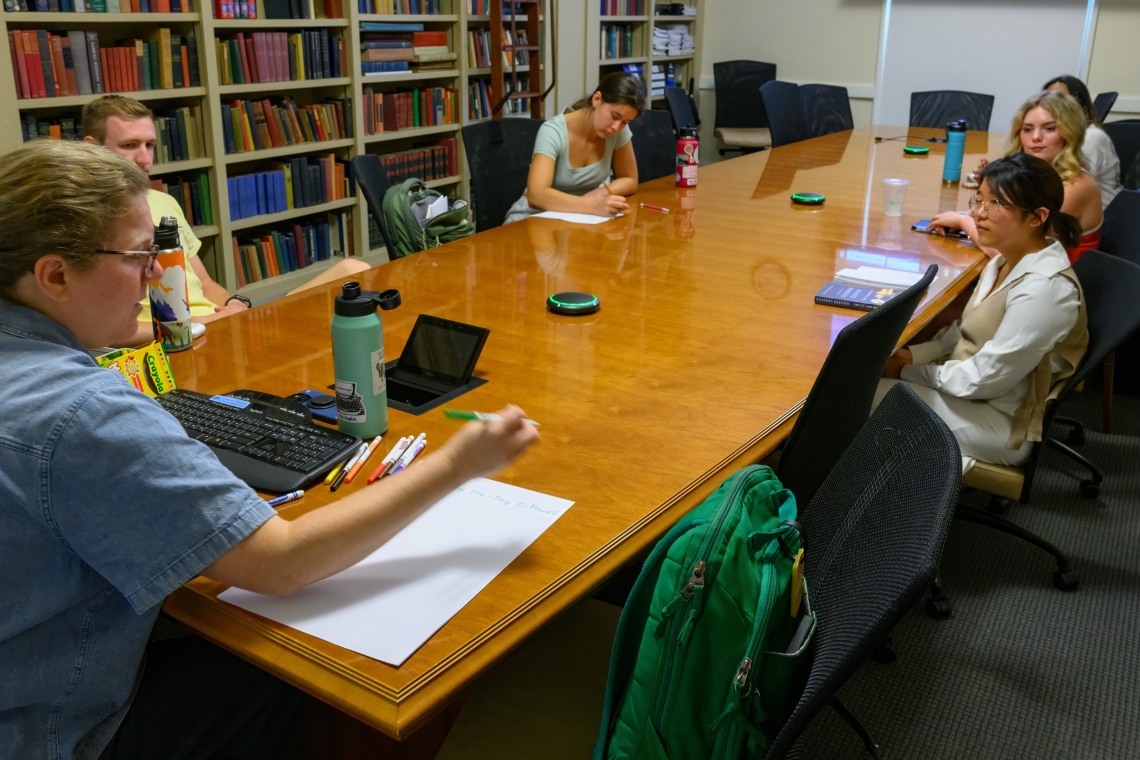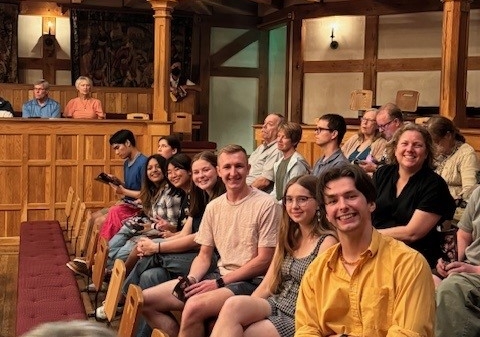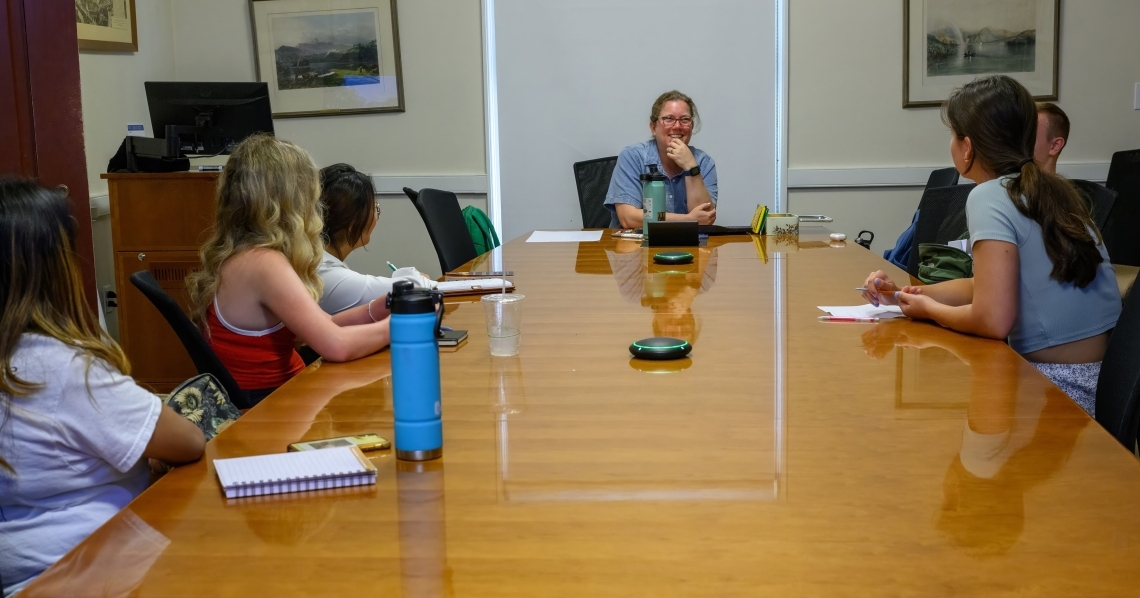From Shakespeare to Sci-Fi While exploring the connections between “Station Eleven” and William Shakespeare, professor of English Holly Pickett and her crew of summer research students examined the foundational value of the humanities to society.

I think that the humanities are concerned by what it means to be human beyond the facts of life.”
~ Katherine Hudson ’26
Holly Pickett, Washington and Lee University professor of English, always considered “Station Eleven” a hopeful story, but even still, in the fall of 2020, she worried about assigning Emily St. John Mandel’s 2014 post-apocalyptic novel to her students. At a time when interactions came coupled with masked faces and 6 feet of distance to prevent the spread of COVID-19, she settled on teaching only a few chapters of the novel depicting a disintegrated society ravaged by a global pandemic.
But then, at the end of 2021, HBO Max released a miniseries based on the book, visualizing the lives of the troupe of Shakespearean actors who travel from town to town in the years following a pandemic. The show instantly reignited Pickett’s interest in the storyline and its therapeutic mechanisms of using Shakespearean text — especially with characters acting out “Hamlet” instead of “King Lear” in the TV series.
She wrote a paper for the Screen Shakespeares: Form and Technology seminar at the March 2023 Shakespeare Association of America conference and started researching that summer to write an in-depth, peer-reviewed article on the topic. She incorporated the show into a 2023-24 Winter Term class, Health, Care and Compassion on Stage and Screen, and recruited a slew of Summer Research Scholars and Advanced Immersion and Mentoring (AIM) students to spend this past summer diving further into “Station Eleven” and “Hamlet.”
“The people in the Shakespeare troupe perform ‘Hamlet’ almost as a form of therapy and how they deal with a pandemic and their past … the students [in my Winter Term class] understood that; it resonated with them,” said Pickett. “They helped me own that argument. I’m arguing in my article that ‘Hamlet’ has this therapeutic role in the theatre troupe — but it’s also a tragedy. So how does this make sense? The students could understand that [dichotomy].”
Pickett enlisted Summer Research Scholars Wilson Kasischke ’25, Katherine Hudson ’26, Hana Chang ’26 and Alaina Pastore ’25, along with incoming first-years Janette Mariano ’28 and Hailee Wing ’28, to help her unpack her argument that “Hamlet” helps the characters experience catharsis and heal from traumas haunting them.
“I just think the students see things I wouldn’t, and together we can be more than the sum of our parts,” said Pickett. “The best way for me to really learn material is to teach it and then to have discussions about it. I end up thinking more about ‘What’s the most important passage of this section? How does this all fit together?’ The process of thinking that through improves my argument.”
Pickett divided her summer into sections, with weekly assignments and seminar meetings with her research students. They started by reading “Hamlet,” and each student chose a specific research topic to explore within the play, such as religion or gender. They then progressed to reading Mandel’s novel, and upon completion they watched the HBO series. The final three weeks were remote, with each student choosing a scene of “Hamlet” acted by the characters in “Station Eleven” and creating a visual essay and annotated bibliography.
“Throughout the summer, we delved into many different productions of ‘Hamlet,’ their history and their critiques to see how they might have impacted the show,” said Chang. “The type of research I was doing over the summer is not too different from what I do during the normal school year, reading literature and analyzing it. Because our main job was to help professor Pickett generate ideas, we had a lot more freedom in what we looked into.”
The collaborative nature took everyone down unexpected roads through debate, exploring niche ideas and building off each other’s research. Hudson studied “Hamlet” through an ecocritical lens, and through hearing those environmental insights, Chang, who researched costuming, started to look into how the clothing in “Hamlet” and “Station Eleven” reflected the changed natural environment. In another instance, Summer Research Scholars and AIM students all questioned the ending of “Hamlet” and whether (spoiler alert!) Fortinbras’ ascent to the throne was foreshadowed early on, whether he had planned to attack Hamlet or whether the new ruler meant a renaissance for Denmark.
“Everyone got a chance to speak, everyone had unique ideas and perspectives,” said Hudson. “It was the kind of group that knew when to get down to business but also didn’t mind sidetracking to look at something interesting.”
For five weeks over the summer, Mariano and Wing experienced their first official taste as students of W&L through the AIM program, which provides immersive academic opportunities for incoming first-year students from traditionally underrepresented backgrounds. While the academic experience made an impact, Mariano also felt the intangible essence of W&L shine through. Pickett took her scholars and AIM students to Staunton, Virginia, for the American Shakespeare Center’s Blackfriars Playhouse’s “The Complete Works of William Shakespeare (abridged) [revised] (again).” On the way, everyone enjoyed dinner at Pickett’s house.
“During my time with this group and the AIM program, I came to realize that W&L is really one big community,” Mariano said. “Everyone is always open to help and build a connection with someone new. I am glad to have been able to experience this prior to starting school. I think entering college is very nerve-wracking and having people you can ask for help and have already gone through the same things can be helpful.”
And through researching the ways Shakespeare and the arts provided a balm to a crippled culture, Pickett and her summer research students likewise felt inspired by the gravity of humanities research. As quoted often in “Station Eleven” from “Star Trek”: “Survival is insufficient.” Through their own research and by mentally inhabiting the world of “Station Eleven,” they experienced the ways that the humanities elevate the human existence from simply surviving to living.
“We talked a lot about how art can be cathartic, how it can allow creators an escape or a vessel to work through something, and how it can allow audiences a chance to relate or be encapsulated by something greater than themselves,” said Hudson. “I think that the humanities are concerned by what it means to be human beyond the facts of life. Studying this meaning — how people choose to portray their perception of the world, their self, their environment and others — goes beyond the realm of established knowledge and into something uniquely creative.”
 Holly Pickett took her group of summer students to the Blackfriars Playhouse in Staunton, Virginia.
Holly Pickett took her group of summer students to the Blackfriars Playhouse in Staunton, Virginia. The group of Summer Research Scholars and AIM students met regularly with professor of English Holly Pickett to discuss “Station Eleven” and “Hamlet.”
The group of Summer Research Scholars and AIM students met regularly with professor of English Holly Pickett to discuss “Station Eleven” and “Hamlet.”
You must be logged in to post a comment.